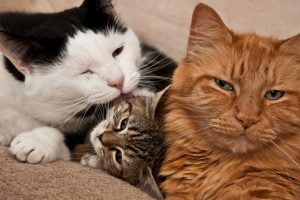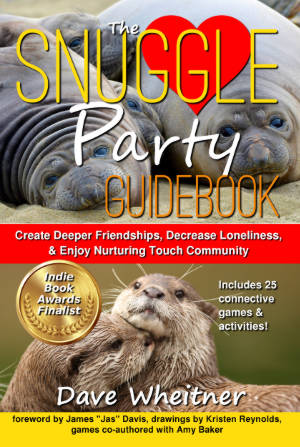How might snuggle parties help people in addictions recovery?
Many types of addictions, and the resulting health and crime issues, are skyrocketing. They are decimating families and communities. As just one example, U.S. fatal heroin overdoses recently tripled in just three years. Even more people are dying from prescription opioid painkillers.
My own family has been affected by addictions, and there’s a good chance yours has, too. What can we do?

There’s no one magic solve-it-all solution. But there is one approach that could make a pretty big difference. And it’s a lot cheaper and easier than many other strategies.
While scientific snuggle party studies don’t yet exist, there are many reasons to believe that snuggling and cuddling may be especially supportive during addictions recovery. These activities could also help to make people less susceptible to addictions in the first place.
- There is evidence to suggest that lack of connection often plays a major role in addictions. (See video below.)
- Snuggle parties provide a safe space where you can meet some of your physical intimacy needs, without the intensity that often accompanies romantic relationships.
- By enabling you to meet some physical intimacy needs, snuggle parties can make you less desperate to jump into another romantic relationship before you’re emotionally ready. This allows extra time and space to focus on your recovery, and helps you to be more discerning when you enter a relationship.
- If you are already in a romantic relationship, snuggle parties can help to protect you from overdependence on one person.
- Snuggle parties provide a safe space for practicing boundary setting and open communication around what you do and don’t want. This includes saying yes, no, and negotiating. This can help you to replace aspects of codependent relating, such as all-or-nothing thinking, with healthier behaviors.
- Snuggle parties directly provide affection, acceptance, and connection sometimes sought indirectly through addictive behaviors.
- Snuggle parties encourage the body to release natural “feel good” chemicals such as oxytocin, which are a healthy alternative to chemically-induced highs. Snuggling carries little risk of addictions or hangovers!
Watch Johann Hari’s TED talk explaining why he believes “the opposite of addiction is connection”:
What’s wrong with the usual approach to touch?
Experts may recommend steering clear of romantic and sexual relationships for an extended period during addictions recovery. This is for a few reasons:
- To allow yourself time and energy to focus upon on your own healing and recovery
- To avoid some of the emotional triggers and codependency that can tempt you to re-enter addictive patterns
However, addictive and codependent behavior often includes difficulty moderating how people relate to themselves, other people, and things:
- You may relate to drugs, food, alcohol, money, sex, or other things in excessive or self-depriving ways.
- You may experience extreme emotions or shut down completely, but have difficulty experiencing the range in between.
- You may experience other people as giving in to your every need or providing you with nothing at all, with little room for negotiating or meeting halfway.
Given the above, the “all or nothing” approach that our culture usually applies to physical intimacy—that is, either you’re in a romantic or sexual relationship where you have an abundance of touch, or you’re single and get very little touch—may not be ideal for people in addictions recovery. Or for anyone, for that matter.
The usual approach provides little opportunity to learn new habits of relating—habits that can replace old and undesired ones.

How can we increase connection?
Snuggling and cuddling, on the other hand–whether it’s a group event like a snuggle party or one-on-one cuddling with a friend or professional cuddler–provide an opportunity to develop new habits of connecting.
Compare this to our common approach of isolating people in jail or prison, where they become even more disconnected.
Snuggle parties and one-on-one cuddling are not replacements for therapy or psychoeducational/ emotional support groups, but they may complement and enhance them in important ways.
Download a free printable brochure on Snuggle Parties, Snuggling, and Cuddling in Addictions Recovery.*
Want to start a touch-positive group in your area, and inspire others to get involved? Get a copy of The Snuggle Party Guidebook today, and ask your library to order a few copies for your community.
*A huge thanks to Buster Ross for inspiring this resource.

